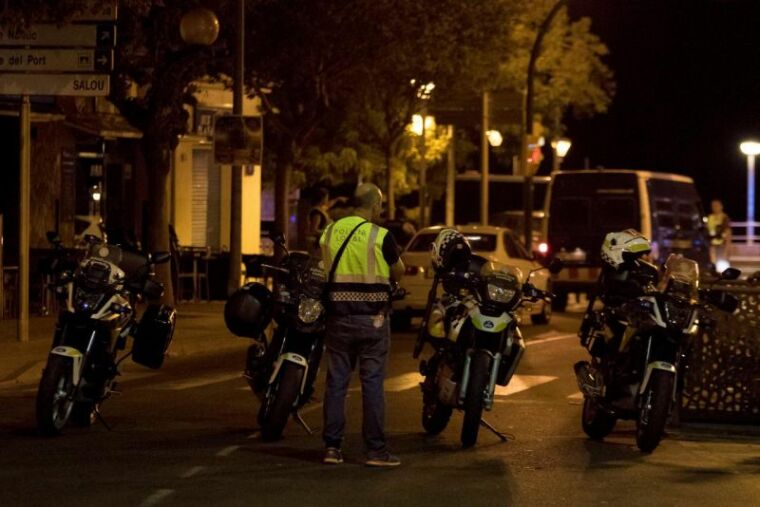ISIS affiliate poised to carry out attacks across Europe, report claims

The Moroccan terror group that was responsible for the recent attacks in Spain is reportedly just a part of a much larger group affiliated with the Islamic State that is poised to launch more attacks in at least six European countries, according to a report from DEBKAfile.
Spanish Interior Minister Juan Ignacio Zoido has reportedly assured that the terrorist network responsible for the recent attacks in Cambrils and Barcelona had been "fully dismantled" and no longer posed a threat. But independent security and intelligence journalists at DEBKA had warned that there are "troubling signs" that the recent attacks were "no more than the opening shots of a major onslaught" in preparation by the ISIS affiliate.
According to DEBKAfile's intelligence and counterterrorism sources, the dismantled terror cell was only "one branch of a broad terror network stretching out from Morocco across at least six European countries: Spain, France, Germany, Belgium Holland, and as far north as Finland."
In May, Spanish and Moroccan intelligence agencies working together have reportedly uncovered a terror network that had deployed cells across Europe. The jihadists, who crossed the Mediterranean from Tangiers, Morocco, to Melilla, Spain established their new base of operations in Catalonia, according to the report.
DEBKAfile further noted that most of the perpetrators of the attacks in Catalan were local residents of Moroccan descent, some of whom had direct links to ISIS contacts in Syria and Iraq. Some were reportedly discovered leaving Spain to fight with the jihadists in Syria.
On May 22, Spanish and Moroccan anti-terror agencies working in conjunction have apprehended a group of terror suspects in Essaouira on Morocco's Atlantic coast. They were reportedly found in possession of large amounts of weapons and preparing to strike a famous music festival that attracts a large number of tourists.
The report stated that the Spanish authorities knew that the Catalan cell, which operated as part of the broad terror network, was run by the "Wilaya of the Islamic State in the Maghreb al-Aqsa-Morocco," which takes orders from ISIS central command in Syria.
Despite the arrests of local Muslim extremists on their way to Morocco or Syria, no high-security alerts were issued by the authorities during the peak season at Catalonia's holiday resorts.
According to The Guardian, up to 1,000 jihadists are believed to have been smuggled back to Morocco and Tunisia from the battlefields in the Middle East.
A former leading member of the extremist group's external operations arm has recently said that he believes some Moroccan jihadists who sneaked back into North Africa could use its proximity to Spain to launch further attacks or infiltrate further into the continent.
Moroccan authorities have claimed that they were able to prevent several large-scale terror attacks in Casablanca and Rabat, but they are not capable of stopping their nationals from conducting operations on foreign soil.
 Christians don't have to affirm transgenderism, but they can’t express that view at work: tribunal
Christians don't have to affirm transgenderism, but they can’t express that view at work: tribunal Archaeology discovery: Medieval Christian prayer beads found on Holy Island
Archaeology discovery: Medieval Christian prayer beads found on Holy Island Presbyterian Church in America votes to leave National Association of Evangelicals
Presbyterian Church in America votes to leave National Association of Evangelicals Over 50 killed in 'vile and satanic' attack at Nigerian church on Pentecost Sunday
Over 50 killed in 'vile and satanic' attack at Nigerian church on Pentecost Sunday Ukrainian Orthodox Church severs ties with Moscow over Patriarch Kirill's support for Putin's war
Ukrainian Orthodox Church severs ties with Moscow over Patriarch Kirill's support for Putin's war Islamic State kills 20 Nigerian Christians as revenge for US airstrike
Islamic State kills 20 Nigerian Christians as revenge for US airstrike Man who served 33 years in prison for murder leads inmates to Christ
Man who served 33 years in prison for murder leads inmates to Christ


 Nigerian student beaten to death, body burned over ‘blasphemous’ WhatsApp message
Nigerian student beaten to death, body burned over ‘blasphemous’ WhatsApp message 'A new low': World reacts after Hong Kong arrests 90-year-old Cardinal Joseph Zen
'A new low': World reacts after Hong Kong arrests 90-year-old Cardinal Joseph Zen Iran sentences Christian man to 10 years in prison for hosting house church worship gathering
Iran sentences Christian man to 10 years in prison for hosting house church worship gathering French Guyana: Pastor shot dead, church set on fire after meeting delegation of Evangelicals
French Guyana: Pastor shot dead, church set on fire after meeting delegation of Evangelicals ‘Talking Jesus’ report finds only 6% of UK adults identify as practicing Christians
‘Talking Jesus’ report finds only 6% of UK adults identify as practicing Christians Mission Eurasia ministry center blown up in Ukraine, hundreds of Bibles destroyed: 'God will provide'
Mission Eurasia ministry center blown up in Ukraine, hundreds of Bibles destroyed: 'God will provide' Church holds service for first time after ISIS desecrated it 8 years ago
Church holds service for first time after ISIS desecrated it 8 years ago Burger King apologizes for 'offensive campaign' using Jesus' words at the Last Supper
Burger King apologizes for 'offensive campaign' using Jesus' words at the Last Supper Uganda: Muslims abduct teacher, burn him inside mosque for praying in Christ’s name
Uganda: Muslims abduct teacher, burn him inside mosque for praying in Christ’s name